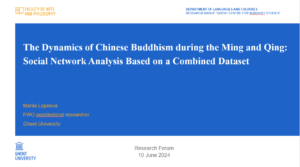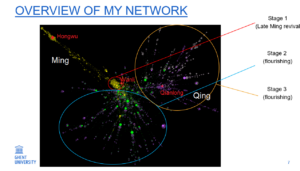The last meeting of GCBS’s Research Forum for this academic year took place on June 10, at 4 pm. FWO postdoc Mariia Lepneva presented the paper that she will further discuss at the European Association of Chinese Studies conference in August. The details of the presentation are as follows:
Title: “The Dynamics of Chinese Buddhism during the Ming and Qing: Social Network Analysis Based on a Combined Dataset”
Abstract: This paper addresses the revival of Chinese Buddhism during the late Ming and early Qing with the use of social network analysis. It introduces an innovative approach for a partial use of the large-scale dataset “Historical Social Network of Chinese Buddhism,” which makes the research technically more feasible and creates new data for inclusion in the dataset. A portion of the data related to the historical period in question is extracted from the original dataset and combined with the new data gathered by the author from primary sources. Focusing on the problem of the periodization of the Buddhist revival, this research analyzes the differences that emerged in the graph with the introduction of the additional data as compared to Marcus Bingenhimer’s earlier take on this topic. The results for the first stage of Buddhist revival corroborate a recent scholarly suggestion that the rise of vibrancy in the Buddhist community might have started around the middle rather than the late sixteenth century. The layout for the second stage remains largely the same, as the additional data hardly touched upon the Chan lineages that dominated the seventeenth century. Finally, my network supports the neglected idea expressed in Japanese scholarship that the vibrancy of Chinese Buddhism did not fade away by the end of the seventeenth century but rather continued until the end of the eighteenth century. The conclusion of the paper introduces primary sources and directions for further research that can be pursued with the use of the innovative methodology suggested here.

